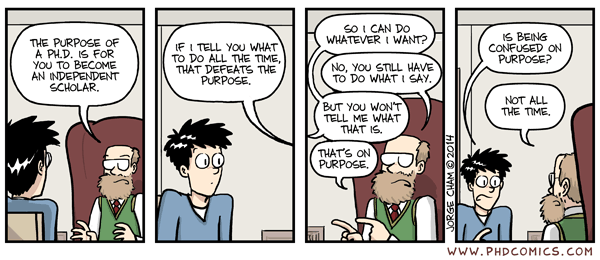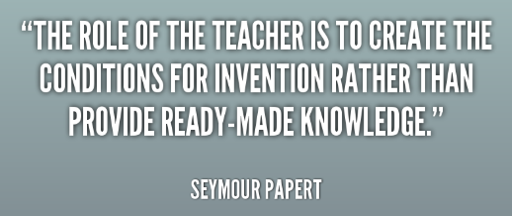
“Piled High and Deep”, www.PHDCOMICS.com, by Jorge Cham
I have started writing this post on 6th July, the day of Guru Purnima (Teacher’s day).
It is important to realize that PhD is ‘your’ journey across ‘uncharted waters’ in search of the holy land. You are the one who is on the quest of undiscovered knowledge. Your research guide is just that – a guide who will give you your directions. He shows you the process – he does not perform the process for you!
This is important – as i have known a distinguished academician griping how a prospective PhD candidate from the industry came to him with an unethical expectation of “commissioning him to do his PhD thesis”.
In my case, my research guide set the compass correctly on day 1 – he gave me his expectations and my directions in form of a schedule (ref Tip 1 ). I was to work on my thesis from day 1 – each period (typical quarter or 2) would see a specific leg of the journey complete. This covered all the chapters of my thesis from introduction to literature review to development of the research concept, problem, research methodology, data collection, analysis and discussion of the results. I stuck it in my study on a soft-board and followed it with ‘reasonable’ rigor.
‘Reasonable’ rigor because the fact is that I could not stick to his original calendar of 2.5 years. There were life events – my daughter’s marriage and my role as chairman of IESA – resulted in the extension of this to 3.25 years! But the fact is, I had completed the initial few steps – and my guide had set a fairly practical schedule of finishing the thesis in 2.5 years ( keeping a buffer of 1.5 years for slippages). The initiating 4 chapters were on schedule and therefore, the last few were a matter of process. Imagine the plightof the PhD scholar who loses time because he thinks he can complete his PhD at one go in some magical motion in the last year of his PhD program!
It is just this disastrous situation that is prevented by a good guide. My guide was always very encouraging in all my review meetings. There were mistakes, there were different pathways and more demanding suggestions – but I must record it as a simple fact, my guide was always soft, encouraging and empathic. His positivism was one of the factors that kept me on my journey over the years.
When I started my PhD program, I recall one of the professors presenting perspectives on epistemology and ontology and how these shaped the research. It is relevant to understand that there are specific guidelines on what constitutes knowledge. Many research institutes want empirically positive research. I recently met a PhD scholar in his 2nd year who shared that he would be submitting a purely qualitative research. I really wonder if he had discussed his thoughts with his guide. A research guide is not a mind-reader…if we do not take regular meetings with him and follow the process he cannot advise on potentially wrong methodologies – and potential traps where the work would sink when it went to the various reviewers and to the research committees ( internal and external)
As a part-time PhD, I could only meet my research guide 3-4 times in a year. It is important that a proper meeting log is maintained as it will serve to keep an audit record of the progress and prevent any miscommunication.
I summarize the role of the guide with the following 4Es:
1.Expertise . He is compass to show you the direction to your destiny- your compass in your journey. It would be good if he had domain expertise ( or you could have a supporting co-guide) but he definitely would be the expert on the PhD process and PhD standards of your institution’s academic council.
2.Empathy. If you are a PhD scholar – you are above average in academics. But the journey can be demanding. You need a guide who can empathise with you on our pain and morally boost you on the journey. Imagine how demoralized I could be if I was told that I was not going to be able to make it thru on my PhD just because I slipped a milestone because of daughter’s marriage.
3.Encouragement. Positive strokes from guide made all the difference as I rolled on-wards on my journey.
4.Ethics. Are relevant for us to produce good work that we are proud of. An ethical approach makes sure that the standards are defined and delivered at both ends.
All said, I am happy to share that my guides were amazing people to work with – and it is a fact that PhD was a quest for knowledge, but it also became a journey of self-discovery, of my testing myself on my grit and commit to execute on expectations.
And to conclude this post – here are a couple of quotes:
Sadhguru on “what is the role of a Guru?“
” If I were a moral teacher, I would try to change you. Because I am a Guru, I do not try to change you. I do not ask you to be good; I do not ask you to be peaceful; I do not ask you to be nice to others, because I do not intend to change you like that. That would be just a pretention which would build up over a period of time and implode at some point.
My intention and my work are to bring clarity.“

